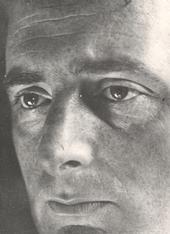Dziga Vertov, was born by the name of Denis Arkadyevich Kaufman in 1896 in Poland. During his early years he studied music (violin and piano) at the Bialystok Conservatory. He was never able to complete his studies as he was forced to flee to Moscow with his parents due to the overtaking by the German army. This talent with music was to prove useful later on in one of Vertov’s most celebrated films, Enthusiasm.
In 1916 and 1917, while pursuing his medical studies in St. Petersburg, Vertov began experiments with sound recordings and soon after created the Laboratory of Hearing. Vertov was to declare that the ears were equal in importance to the eyes and that sound should be carefully constructed in films. Vertov's work was very much influenced by the Italian Futurist art movement which was concerned at that time 'with the use of sound in general and industrial noise in particular. They, like Vertov rejected convention and opted for an art form filled with experimentation.
In 1918, Vertov joined the Film Committee of the People’s Commissariat of Public Education in Gnezdnikovsky Street in Moscow, becoming the writer and editor of Kinonedelia (Film-week) which was to be the first newsreel program produced by the Soviet Government. This is where he would meet Elizaveta Svilova who was later to become his wife and co-worker. Through these newsreel programs, Vertov began experimenting with editing styles in order to produce work that would create much impact on his audience. In 1919 he edited the full-length compilation film Anniversary of the Revolution which he followed with two short films Battle of Tsaritsyn and The Agit-Train.
Vertov started his own newsreel series Kino-Pravda (Cine-Truth) which was named to honour the official Soviet newspaper Pravda which had been founded by Lenin. Vertov's Kino-Pravda was ‘issued regularly...offering reportage on an extremely wide variety of subjects and acted as a laboratory for the development of a film vocabulary. In 1922, Vertov formed the Council of Three with his wife, Svilova and brother Mikhail Kaufman, in which they developed their own principles of filmmaking which was to be written up in manifestos. This is where their rejection of fiction films became blatantly obvious as they vowed that documentary style filmmaking was to be the form in which they would only practice.
In 1923 'the first centralised state cinema organisation, Goskino, had been established but it had to compete with other private, state and mixed-finance organisations, without being given adequate funds to do so. While only having 5 cinemas, Goskino was to be the place that Vertov would work for, until his departure, in which he claimed was due to unsatisfactory working conditions as well as the little distribution that his films were receiving. He moved on to work for VUFKU (the Pan-Ukrainian Committee of Cinema and Photography) in which he was able to enjoy more artistic freedom. VUFKU was to be a place where he would experiment and where he developed some major productions, ie: The Eleventh Year, The Man With a Movie Camera. But Vertov's time with VUFKU took a wrong turn as he was dismissed by them, charged with formalism. At the time of their release, Vertov's films only received moderate praise as they were considered to be unintelligible for the masses and too experimental.
After the production of Enthusiasm in 1931, Vertov was to create another masterpiece, Three Songs of Lenin, which was a tribute in 3 parts to the former leader of the Soviet Union, Vladimir Lenin. This work was highly praised especially because it was one of his films that conformed the least with his experimental ways and therefore audiences were able to appreciate it. But for Vertov, Three Songs of Lenin was a production that didn't please him to make. He very explicitly revealed in his writing, Dziga Vertov: My Ilness, that the impositions placed on him by RAPP (Russian Association of Proletarian Writers) was to take the joy out of his filmmaking as he was forced to abandon the documentary genre. His career from then onwards was on a steady decline as he was no longer able to make his experimental films and he died in 1954 of cancer, almost forgotten by the Soviet people.
